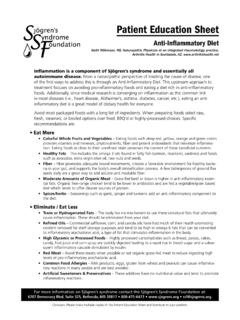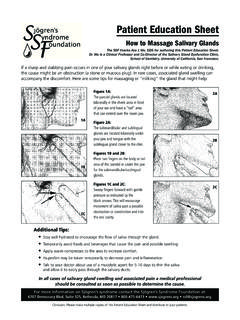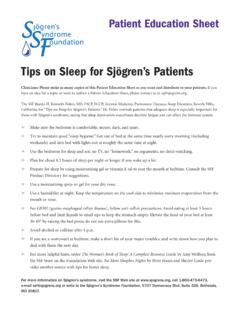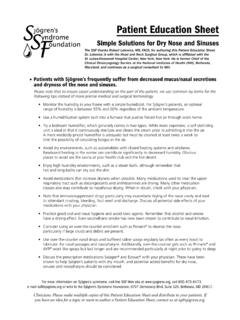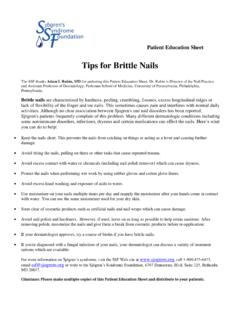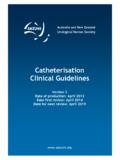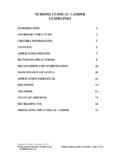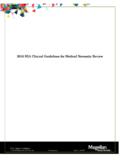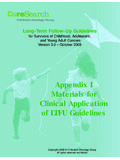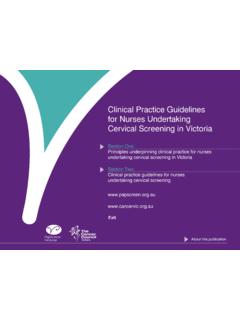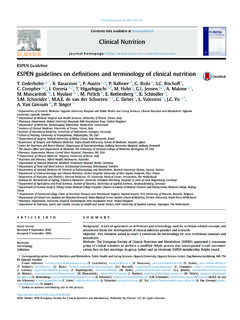Transcription of Sjögren’s Systemic Manifestations in Sjögren’s …
1 Gren s Syndrome Foundation s clinical Practice GuidelinesThe Sj gren s Syndrome Foundation (SSF) has developed the first Rheumatology clinical Practice guidelines for Sj gren s to ensure quality and consistency of care for the assess-ment and management of patients by offering recommendations to clinicians for Systemic disease , treatment guidelines for serious organ involvement from Sj gren s were borrowed from those used to treat Systemic Lupus Erythematosus (SLE) and Rheumatoid Arthritis (RA). Among the recommendations, the guidelines address the treatment of inflammatory, muscu-loskeletal pain in Systemic Sj gren s, use of biologic agents and management of Rheumatology guidelines Summary and RecommendationsFor the development of the SSF Rheumatology guidelines , a highly rigorous and transparent process was employed with important guidance from the American College of Rheumatolo-gy and the Institute of Medicine.
2 An extensive, systematic literature review by Topic Review Groups (TRG) was followed by data extraction and drafting of recommendations to be con-sidered by separate consensus expert panels (CEP) consisting of academic and community practice clinicians, registered nurses and patients. Using a modified Delphi-type consensus process, the CEP reached consensus on eighteen recommendations with consensus set at a minimum of 75% for Musculoskeletal PainRecommendations regarding the use of disease-modifying anti-rheumatic drugs (DMARDs) to treat musculoskeletal (MSK) pain were presented as a decision tree with use of hydroxy-chloroquine (HCQ) as the first-line therapeutic approach.
3 Although HCQ treatment failed to reach the primary endpoint for pain in a recent, randomized control trial, other studies have shown that following HCQ treatment, Sj gren s patients demonstrated improvement in inflammatory markers and MSK pain. The favorable safety profile of HCQ contributed to the 92% positive agreement of the Rheumatology Working Group. Thus, the recommendation for the use of HCQ received a moderate strength rating and is considered a best clinical practice first-line therapy. Biological MedicationsBiological therapies such as rituximab will become increasingly important in the management of Sj gren s patients and are best used in Sj gren s patients with serious organ manifesta-tions who fail more conservative treatments.
4 There was strong consensus that TNF- inhibi-tors not be used to treat sicca symptoms in patients with Sj gren s. This recommendation was qualified by the consideration that clinicians should not withhold TNF- inhibitor treatment if a patient also suffers from another condition for which such treatment would be indicated. FatigueFatigue is most effectively managed with self-care measures and exercise. Exercise provides similar benefit to reduce fatigue in Sj gren s patients as was seen for those with RA, SLE or Multiple Manifestations in Sj gren s PatientsThe Sj gren s Syndrome Foundation clinical Practice guidelines Committee (CPGC): Steven E. Carsons1, Ann Parke2, Frederick Vivino3, Nancy Carteron4, Richard Brasington5, Robert Fox6, Stuart Kassan7, R.
5 Hal Scofield8, Julius Birnbaum9, Steven Mandel10, William Ehlers11, Vidya Sankar12, Katherine Morland Hammitt13. 1 Winthrop University Hospital & Stonybrook University School of Medicine, 2St. Francis Hospital & Medical Center & University of Connecticut, 3 Presbyterian Medical Center, University of Pennsylvania, 4 University of California San Francisco, 5 Washington University School of Medicine, 6 Rheumatology Clinic, 7 Colorado Arthritis Associates & University of Colorado, 8 Oklahoma Medical Research Foundation, University of Oklahoma Health Sciences Center and Department of Veteran Affairs Medical Center, 9 Johns Hopkins University School of Medicine, 10 Hofstra-North Shore-LU School of Medicine, 11 University of Connecticut, 12 University of Texas Health Science Center at San Antonio Dental School, 13Sj gren s Syndrome Foundation.
6 This information was published in Arthritis Care & Research. Please visit to find the most updated information about the SSF clinical Practice guidelines and be sure to talk to your physician about them. 1 Recommendations for Systemic Disease Management in Sj gren sRecommendationsRecommendation #1 TNF- Inhibitors Strength of Recommendation TNF- inhibitors SHOULD NOT BE USED to treat sicca STRONG symptoms in patients with primary Sj gren s.* * Note that this recommendation should not be interpreted to discourage use of TNF- inhibitors in situations where there is overlap of Sj gren s with rheumatoid arthritis (RA) or other conditions where TNF- inhibition therapy is indicated for the treatment of inflammatory #2 TNF- Inhibitor Cautions If TNF- inhibition therapy is used for RA or other related overlap conditions in STRONG Sj gren s patients, health care providers should consider and monitor for the following.
7 * *Patients and physicians should refer to the FDA label for additional informationRecommendation #3 Rituximab for KCS Rituximab MAY BE CONSIDERED as a therapeutic option for keratoconjunctivitis WEAK sicca (KCS) in patients with primary Sj gren s and for whom conventional therapies, including topical moisturizers, secretagogues, anti-inflammatories, immunomodulators and punctual occlusion, have proven #4 Rituximab for Xerostomia Rituximab MAY BE CONSIDERED as a therapeutic option for xerostomia in patients with WEAK primary Sj gren s with some evidence of residual salivary production, significant evidence of oral damage as determined by the clinician, and for whom conventional therapies, including topical moisturizers and secretagogues.
8 Have proven #5 Rituximab for Systemic Symptoms Rituximab MAY BE CONSIDERED as a therapeutic option for adults with primary MODERATE Sj gren s* and any or all of the following Systemic Manifestations :*Note: These patients should have had a suboptimal response to standard oral DMARD agents and/or have experienced unacceptable toxicity from these agents or corticosteroids or are incapable of tapering and discontinuing #6 Rituximab Cautions Patients and health care providers should be aware that, although uncommon, significant STRONG harms may be associated with the use of rituximab and should exercise caution and observe for the following when using Rituximab in Sj gren s patients.
9 **Patients and physicians should refer to the FDA label for additional Therapies** Three rounds of Consensus Expert Panel (CEP) review and voting took place for the RTX /xerostomia Recommendation, and 2 rounds were held for the remainder. Recommendation #5 on RTX/ Systemic management was reviewed an additional time by the CEP for both Biological Therapies and Fatigue. l Hepatitis B reactivationl Hepatoxicityl Heart failurel Cytopeniasl Hypersensitivity; Serious infusion reactionsl Demyelinating disease l Lymphoma and other malignancies; health care providers should be cognizant that patients with primary Sj gren s have an increased risk of non-Hodgkin s lymphoma as compared to the general populationl Serious infections, including tuberculosisl Invasive fungal infectionsl Inflammatory arthritisl Pulmonary diseasel Peripheral neuropathy especially mononeuritisl Cryoglobulinemia associated with vasculitisl Vasculitisl Severe parotid swellingl Infusion reactionsl Tumor lysis syndrome in those with NHL l Progressive multifocal leukoencephalopathy (PML)
10 L Hepatitis B reactivation with possible fulminant hepatitisl Severe mucocutaneous reactions l Infectionsl Bowel obstruction and perforationl Cardiac arrhythmias and angina l Cytopenias l Serious bacterial, viral or fungal infectionsl In pregnancy and nursing, the risk vs benefit must be carefully considered l Health care providers should avoid giving live vaccines when patients are on for Inflammatory MSK PainRecommendations are provided with the following caveats and then listed in a step-by-step process:l The physician is advised to consider an individual patient s circumstances when weighing risks and benefits of each therapy. l Insufficient evidence exists on the effectiveness of DMARDs in the treatment of inflammatory musculoskeletal pain in primary Sj gren s.

